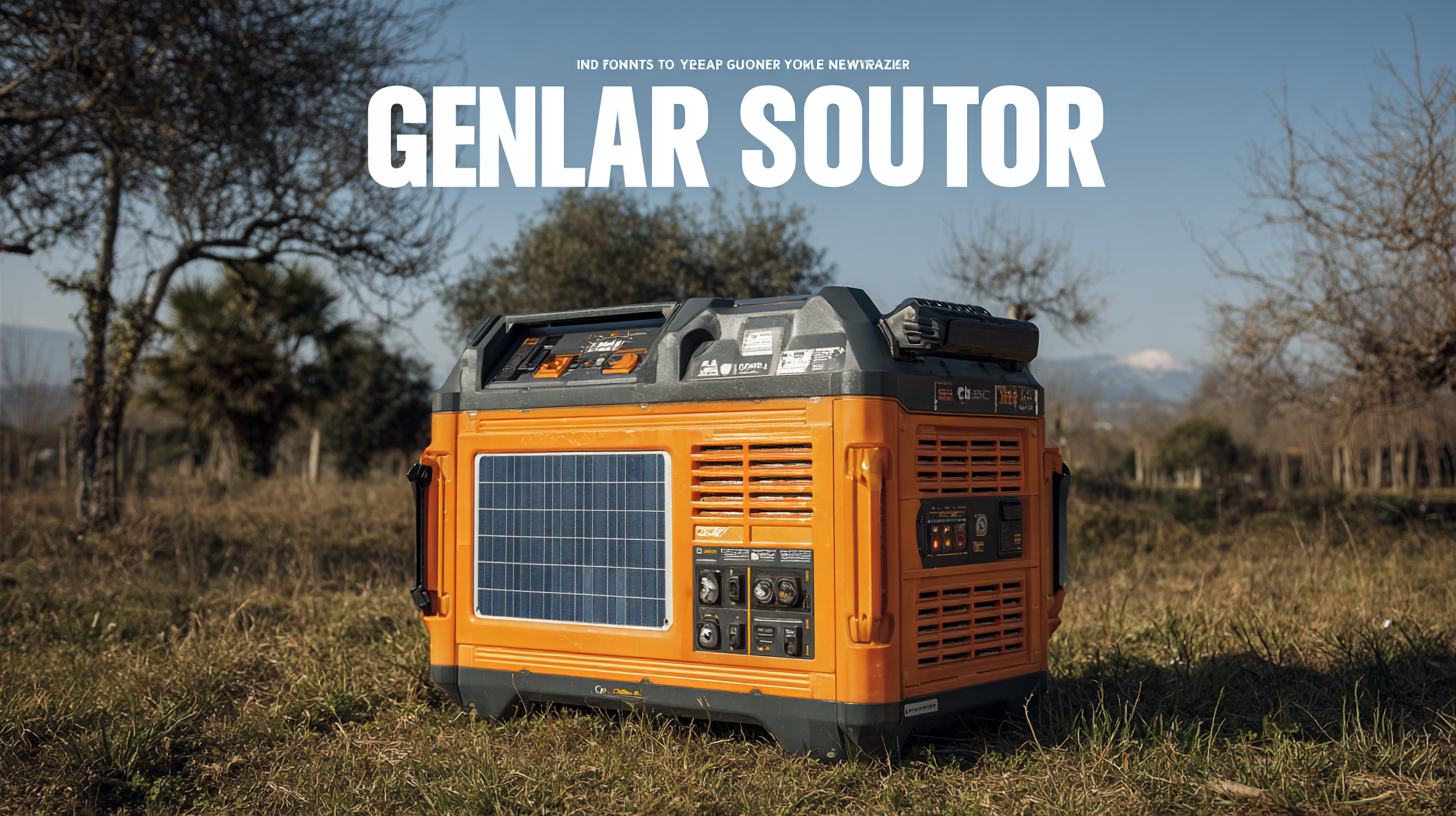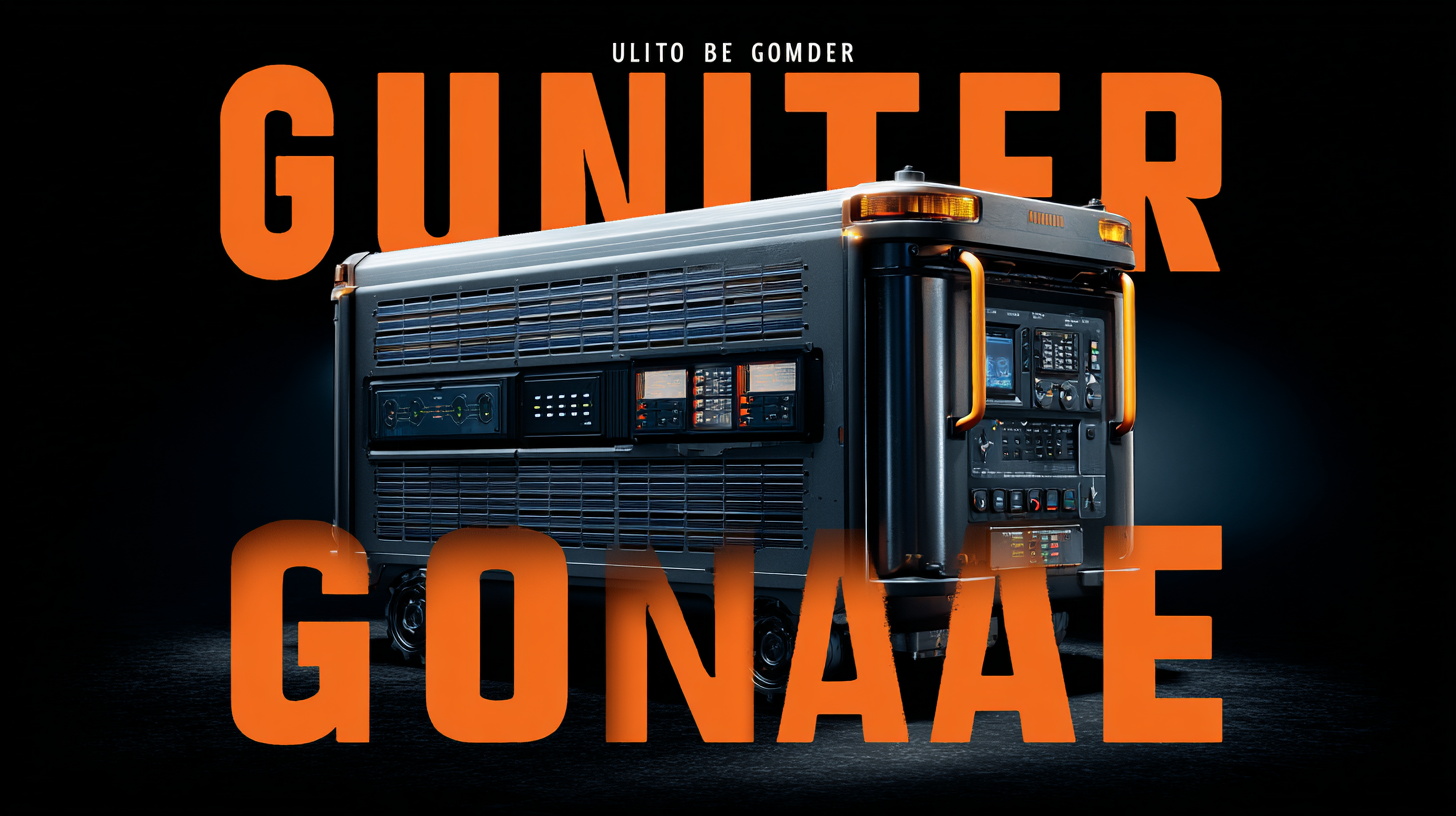Ultimate Guide to Choosing the Best Solar Generators for Your Energy Needs
As the world increasingly embraces renewable energy, the demand for efficient and reliable power sources has surged, particularly in the form of Generator Solar systems. According to the International Energy Agency, the solar power capacity increased by over 22% in 2020 alone, highlighting a growing trend towards sustainable energy solutions. With this shift, solar generators have emerged as essential tools for both residential and commercial use, providing clean energy for essential appliances during outages or in off-grid situations. This guide aims to navigate the myriad options available in the solar generator market, ensuring that consumers can effectively evaluate their energy needs and make informed decisions. By understanding the key features and benefits of various solar generators, users can harness the sun's power to achieve energy independence and reduce their carbon footprint.

Understanding the Different Types of Solar Generators Available on the Market
The global market for solar generators is experiencing significant growth,
anticipated to expand from a valuation of $591.09 million
in 2024 to an impressive $1,018.29 million by 2028. This surge is indicative
of the increasing demand for renewable energy solutions, driven by both environmental concerns and the need for
reliable off-grid power sources. Understanding the different types of solar generators available is crucial for
consumers looking to meet their energy needs efficiently.
Solar generators typically fall into three main categories: portable power stations,
solar-powered backup systems, and solar generators designed for off-grid living.
Portable power stations are ideal for weekend camping trips or as emergency power sources during outages due to
their compact design and ease of use. In contrast, solar backup systems can seamlessly integrate with home electrical
systems, providing reliable energy during grid failures. Furthermore, off-grid solar generators cater to those looking
to completely detach from traditional energy sources, offering an eco-friendly solution
to meet all energy demands. Each type comes with unique benefits, making it essential for users to assess their
specific requirements before making a decision.
Evaluating Your Power Needs and Selecting the Right Generator Type
When evaluating your energy needs for selecting the right solar generator, begin by assessing your power requirements. Consider the appliances you intend to power, their wattage, and the total energy consumption you expect. Calculate the peak and continuous wattage demands; peak demand refers to the maximum load during initial startup, while continuous demand is the energy needed while running. Understanding these metrics ensures that your generator can handle your energy consumption efficiently.

Next, think about the different types of solar generators available on the market. With the increasing focus on sustainable energy solutions, various models cater to diverse requirements. Some generators are optimized for portability, making them ideal for camping or emergency use, while others are built for stationary applications, delivering higher capacities for home or commercial use. Additionally, explore features like battery life, charging speed, and inverter capabilities to find a generator that aligns with your specific energy usage patterns. With projections indicating substantial growth in the generator market, making an informed choice will enable you to invest in a solution that meets your future energy demands effectively.
Portability vs. Performance: Choosing the Best Fit for Your Lifestyle
When selecting a solar generator, the choice between portability and performance becomes crucial, particularly for those who lead active lifestyles or require reliable energy solutions.
Portability is often favored by campers, hikers, and outdoor enthusiasts who need a lightweight and easy-to-carry unit. Choosing a model with a compact design and a convenient handle can significantly enhance your outdoor experience, allowing you to harness solar power effortlessly. Look for solar generators that weigh under 20 pounds and have a robust battery capacity to ensure you’re not sacrificing power for ease of transport.
On the other hand, performance should not be overlooked, especially if you aim to power larger devices or need a backup energy source for home use. In this case, focus on solar generators with higher wattage outputs and larger battery sizes. These models, while less portable, provide a more dependable energy supply for appliances or during power outages. It’s also smart to check for additional features like multiple output ports or fast charging capabilities to enhance overall functionality.
When making your decision, consider also how often and where you plan to use your solar generator. If you intend to use it primarily for off-grid camping, portability may take precedence. However, if you envision emergency preparedness at home or powering heavy tools, emphasize performance first. Finding the right balance according to your specific needs ensures that you choose a solar generator that truly complements your lifestyle.
Comparative Analysis of Renewable Energy Alternatives to Solar Generators
When considering renewable energy alternatives to solar generators, it's essential to explore a few viable options like wind turbines and hydroelectric systems. Wind turbines harness kinetic energy from the wind to generate electricity, making them an excellent choice for areas with consistent wind patterns. On the other hand, hydroelectric systems utilize flowing water to produce energy, offering a reliable power source if you have access to a suitable water body. Both options provide sustainable energy but come with their unique installation and maintenance considerations.
**Tips:** When evaluating these alternatives, consider the local climate and geography. For instance, if you live in a region with strong and consistent winds, investing in a wind turbine may be more beneficial. Additionally, assess the space available for installation, as wind turbines require more room than solar panels. Remember to research incentives and subsidies available for renewable energy installations in your area, as these can significantly offset initial costs and improve your return on investment.
Ultimately, diversifying your renewable energy sources can yield greater efficiency and reliability. By integrating solar generators with wind or hydro solutions, you can create a robust energy system that is less dependent on a singular source. Always analyze your energy requirements, budget, and environmental factors to make the most informed decision for your energy needs.
Ultimate Guide to Choosing the Best Solar Generators for Your Energy Needs
| Feature | Solar Generator | Wind Turbine | Hydro Generator | Biomass Generator |
|---|---|---|---|---|
| Average Output (W) | 600 - 3000 | 400 - 1200 | 500 - 5000 | 1000 - 5000 |
| Fuel Source | Solar Energy | Wind Energy | Water Flow | Organic Materials |
| Average Lifespan | 25 years | 20 years | 30 years | 15 years |
| Maintenance Level | Low | Medium | High | Medium |
| Environment Impact | Very Low | Low | Medium | High |
Key Features to Look for in a Quality Solar Generator for Eco-Friendly Energy
When selecting a solar generator for your energy needs, focus on several key features that contribute to its overall quality and efficiency. First, consider the generator's capacity, which is typically measured in watt-hours. A higher capacity allows you to power more devices simultaneously, making it essential for emergencies or off-grid scenarios. Look for portable models that offer a range of outputs to accommodate various appliances, from small electronics to larger items like refrigerators.
Another critical aspect is the recharge time. Fast recharging capabilities mean you can quickly replenish your battery during the day, ensuring you have enough power for your needs. Additionally, check for compatibility with solar panels, as some generators come with built-in solar charging options, allowing for a seamless transition to renewable energy.
Lastly, prioritize durability and design. A robust build is essential for outdoor use, while a user-friendly interface ensures ease of operation. Investing in a generator with an eco-friendly design not only supports sustainability but often enhances efficiency, minimizing your carbon footprint.


